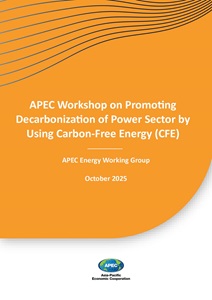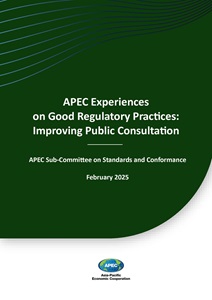
Proceedings
APEC Workshop on Promoting Decarbonization of Power Sector by Using Carbon-Free Energy (CFE)
The Asia-Pacific Economic Cooperation (APEC) is a regional economic forum established in 1989 to leverage the growing interdependence of the Asia-Pacific.
The Asia-Pacific Economic Cooperation (APEC) is a regional economic forum established in 1989 to leverage the growing interdependence of the Asia-Pacific.
APEC ensures that goods, services, investment and people move easily across borders. Members facilitate this trade through faster customs procedures at borders; more favorable business climates behind the border; and aligning regulations and standards across the region.
APEC ensures that goods, services, investment and people move easily across borders. Members facilitate this trade through faster customs procedures at borders; more favorable business climates behind the border; and aligning regulations and standards across the region.
APEC works to help all residents of the Asia-Pacific participate in the growing economy.
APEC works to help all residents of the Asia-Pacific participate in the growing economy.
Capacity building projects play an important role in helping translate APEC's goals into reality.
Capacity building projects play an important role in helping translate APEC's goals into reality.

Proceedings
•February 2025
Download Report
1MB
Published Under
Committee on Trade and Investment (CTI), Sub-Committee on Standards and Conformance (SCSC)
Accessed
988
Pages
39
This report provides the summary of the SCSC Workshop “APEC Experiences on Good Regulatory Practices: Improving Public Consultation”, held on 14 August 2024 in Lima, Peru. The workshop aimed to (i) facilitate information exchange between economies regarding their public consultation initiatives; (ii) enhance collaboration between public and private sector stakeholders from APEC economies to discuss approaches on public consultation, and (iii) identify best practices from participating APEC economies. Speakers and participants engaged in discussions on the challenges economies face when implementing public consultation, the opportunities they have for improving their processes through the use of technology tools, and the importance of establishing mechanisms that are accessible and inclusive for all stakeholders. Public and private sector representatives also explored ideas on collaboration for the improvement of public consultation. These ideas are collected as best practices proposed in this Summary Report.

